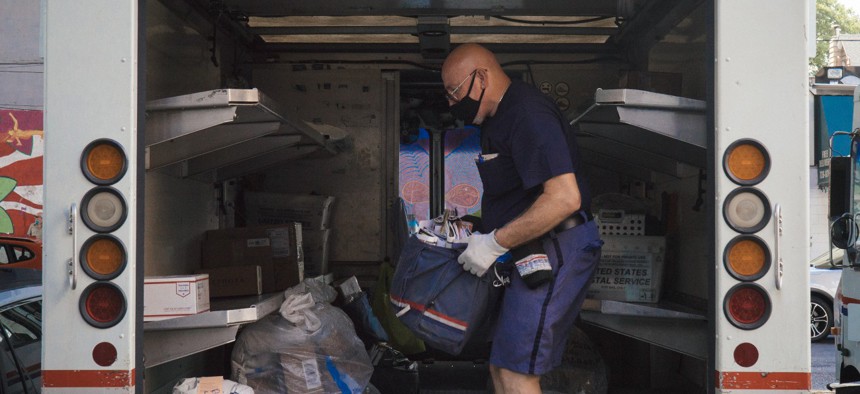
Massimo Giachetti / istock
Regulator Blasts Postal Service for 'Unachievable" Package Slowdown Plan
USPS will also begin slowing down mail delivery this week.
The U.S. Postal Service’s regulator criticized the mailing agency’s plan to slow down package delivery, calling it overly ambitious, non-specific and of little financial benefit.
The package slowdown is part of a larger strategy by Postmaster General Louis DeJoy to allow USPS to break even over the next decade. The Postal Service, which is also about to implement slower delivery for regular mail, has said its existing schedules are unrealistic and too costly to sustain. The Postal Regulatory Commission took issue with the new package delivery schedule, saying management’s goals “appear reasonable” but rest upon unfounded assumptions.
PRC has no power to force the Postal Service to alter its desired course, especially in the realm of packages. As a general matter, USPS has the discretion to make business decisions on its offerings in the competitive space. Still, the mailing agency had to submit its plan to the commission for review, as it did for its mail slowdowns. USPS is seeking to lengthen service standards by one-to-two days for 31% of First-Class packages, while speeding them up by 1 day for 5%.
Postal management failed to demonstrate it could implement its operational plan, provide consistent and reliable service or achieve its anticipated efficiencies, PRC said on Wednesday in its advisory opinion. The mailing agency's assumptions were oversimplified and failed to weigh the complexity of its business, the regulators said, making its model an inaccurate reflection of the “operating environment likely to exist after the proposal is implemented.” Management’s overly rosy outlook included projecting the implementation of changes prior to the peak holiday season, which PRC called “too ambitious.” It added management predicted outcomes that are “potentially inaccurate and unachievable.” Even postal management conceded it would likely not achieve its goal of delivering 95% of packages on time by the end of fiscal 2022.
While PRC said the plan for package delivery would better enable USPS to meet its performance targets, it noted postal management failed to spell out any timetable to do so or assess the impact on customers. The Postal Service did not analyze the impact on recipients of pharmaceuticals, the commission said as an example. The regulator challenged even the proportion of mail that will be impacted, noting USPS relied on 2020 data skewed by the COVID-19 pandemic.
The savings USPS expects from the changes are suspect, PRC added, and even if true would have little bearing on the agency’s overall finances. The commission made a similar finding for the Postal Service’s plan to slow down delivery for regular mail, which is set to go into effect Oct. 1. Postal management’s expected efficiencies rest significantly on shifting more package transportation to trucks rather than planes, calling it more reliable, but PRC said the agency provided insufficient data to support the claim and noted the change would not impact delays caused by failures within processing facilities.
Overall, the commission cautioned in its opinion—which is advisory in nature and carries no enforcement mechanism—that USPS may run afoul of its statutory obligations in implementing the plan. It advised the Postal Service to set interim goals while trying to reach its ultimate target of delivering 95% of packages on time, create a “rigorous analytical methodology” rather than relying on “unproven assumptions,” monitor customer satisfaction and continue engaging stakeholders about the impact of the changes.
“The Commission is concerned, however, that the reasonableness of the proposal rests upon the Postal Service being correct in its assessments about consumer preferences and its ability to achieve the modeled increases in reliability, cost savings, and efficiency,” the commission wrote. “Should the Postal Service prove wrong in its predictions in the above areas, the rational basis for the proposal may prove illusory.”
PRC similarly faulted USPS' assumptions for its mail slowdowns, saying the proposal was not fully thought out and its success was far from guaranteed. Those slowdowns are expected to impact about 40% of First-Class mail. Industry groups, postal unions, members of the public and some lawmakers have all pushed back against the mail and package slowdowns. Critics of DeJoy’s plan have said slowing delivery while raising prices would accelerate ongoing declines in mail volumes and lead to further losses for the mailing agency.







